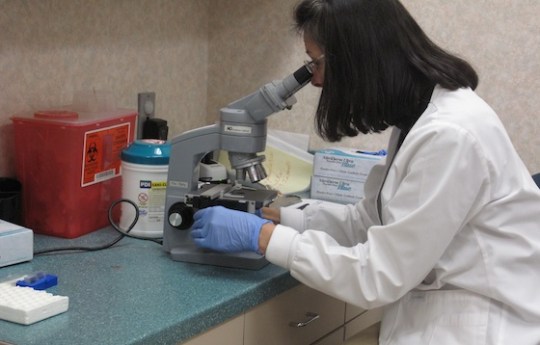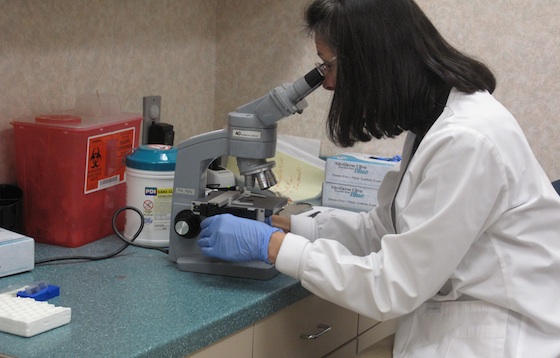
Gainesville — The recent battle over federal funding for Planned Parenthood is still echoing here.
The attempt by congressional Republicans to stop all $327 million of federal Title X money — while targeting Planned Parenthood as an abortion provider — endangered funding for women’s health services at clinics in Hall County, public health workers say. Those clinics are partly funded by Title X money.
Signed by President Richard Nixon in 1970, Title X was established to provide free reproductive health care, including birth control, to women living at or below the poverty level. Although it has never underwritten abortion, some conservatives want to end Title X as a way of cutting federal funds to agencies involved in abortion.
Referring to Planned Parenthood, U.S. Rep. Mike Pence (R-Ind.) recently said, “The largest abortion provider in America should not also be the largest recipient of federal funding under Title X.” He sponsored a bill to end federal funding to the organization.
While the GOP efforts against Title X failed this year, the brouhaha about cutting the money is far from over.
If Title X is abolished, there could be “tragic” consequences for low-income women and for the health care system in Hall County, said Jennifer Parker, the women’s health coordinator for the county. Women with no other resources rely on Title X for overall physical exams as well as screenings for breast cancer and cervical cancer, preventive immunizations, and screenings for sexually transmitted infections, she said.
“We are the only health providers some women see,’’ Parker said. “If we cut Title X, repercussions would be critical for these women.”
Title X cutbacks would affect the wave of new Health Department clients who have flocked there since the economic downturn left them without jobs and health insurance. Every day, more women in this predicament call the Health Department, Parker said.
‘We may have . . . to close our doors’
[youtube]http://www.youtube.com/watch?v=1wA2Pls0-sk[/youtube]Some of these women may have early, treatable cancers. “If a woman comes to the Health Department because she can’t afford birth control, she’s probably not getting Pap smears or mammograms on a regular basis from a private-practice gynecologist,” said Melba Kida, a nurse practitioner at Hall County’s Health Department. “It makes sense that the majority of low-income women depend on the Health Department for cancer screenings.”
Although local health departments aren’t equipped to treat cancer, they can refer patients to physicians participating in the Health Access Initiative, a Hall County Medical Society program that provides inexpensive care to uninsured adults. The Health Department staff also helps women apply for Medicaid if needed.
“We rely very heavily on Title X to keep our program and the department alive,” said Kida. “Even if a woman cannot afford to pay, the Health Department is still mandated to provide services. If we continue to see many people that are unable to pay for care, and we don’t have federal funding, we may have no other choice but to close our doors.”
The state’s Public Health District 2, which includes Hall and 12 other counties, received more than $500,000 in federal funding for fiscal year 2011 to cover staff salaries, supplies and equipment to run reproductive health care programs. All federal money is funneled through the state, and since the recent economic downturn, Parker said, the state has diverted $93,141 from family planning clinics to other programs. Normally, she said, all Title X funds would be depleted by the end of the fiscal year, June 30.
If all federal funds stopped, that would drive more patients to the Good News Clinics, which is Hall County’s only privately run, nonprofit clinic and a major source of free care in the area.
Good News receives no Title X money, but staff member Jean Peeples predicts that its patient load will increase if services are cut at the Health Department. The clinic, which has two volunteer gynecologists who see patients once a week, already handles about 800 monthly visits from uninsured women. Waiting times will increase if cutbacks occur at the county Health Department, Peeples said.
Good News screens for cervical and breast cancer but does not provide birth control assistance.
Title X is a bargain, backers say
Kida disagrees with the conservative rationale for cuts in funding. “Title X doesn’t pay for abortions and never has. It stands to reason that when you have more people pregnant who didn’t want to be, your rates of abortion may very well go up. Do they think that just because there is no family planning, people are going to stop having sex? To me, that just seems shortsighted.”
Small clinics like Good News obviously can’t shoulder the whole burden of family planning, and any decrease in federal support will have to be made up elsewhere — most likely in state taxes, defenders of Title X say. “I think that taking away money from our clinics is just going to result in an even larger burden on our taxpayers,” Parker said.
There is evidence that Title X saves health care dollars in the long run because it provides so many preventive services, including breast exams, Pap smears and screenings for sexually transmitted diseases. The Guttmacher Institute, a research and advocacy group on sexual and reproductive health, estimates the program saves U.S. taxpayers at least $3.4 billion each year.
U.S. Rep. Tom Graves, a Republican whose district includes Hall County, supported the Pence-sponsored bill. A Graves spokesman said the congressman sought “to protect millions of pro-life taxpayers from subsidizing Planned Parenthood, the largest abortion provider in America.”
“This bill is not about health services; it’s about protecting innocent, unborn life,’’ said spokesman John Donnelly.
Meanwhile, on general Title X funding, Parker said it all comes down to the welfare of children born into low-income families.
“Our mission [at the Health Department] is to help families plan for children they can provide and care for, so that when they grow up, they’ll be good citizens of Georgia,” Parker said. And with or without Title X, Parker said, the department “will do everything in [its] power to support that effort.”

